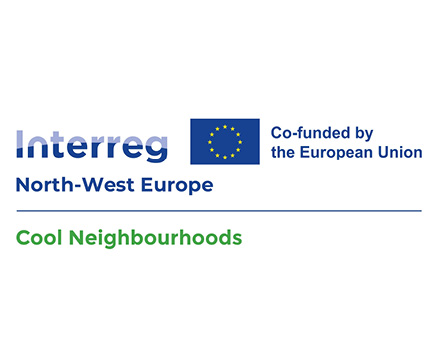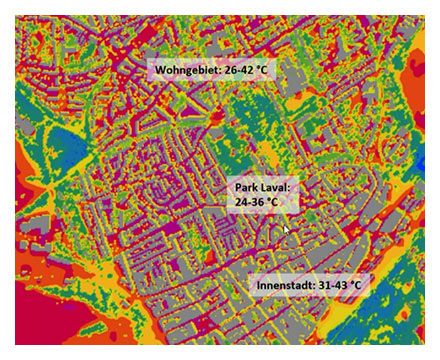


Bioclimatic study of our region
Between 2022 and 2024, the Minett UNESCO Biosphere‘s current bioclimatic situation was analysed. The data collected can be used to provide cities with tools to help them better prepare for the expected impacts of climate change.
CLIMATE CHANGE IS REAL
Scientists agree that human-induced climate change will affect our daily lives. In Luxembourg, the average temperature (for the period 1991-2020) is already 1.5 degrees higher than the average temperature for the reference period 1951-1980. Climatologists also agree that, as a result of the increase in air temperature, extreme weather phenomena (heavy rainfall, storms, heat waves) will become more frequent.
Climate change is a major challenge, especially for urban areas, including the Minett UNESCO Biosphere. Often densely populated, these areas are vulnerable to climate change impacts such as air pollution, extreme weather events and heat waves. Cities are also major contributors to climate change, accounting for around 70% of global greenhouse gas emissions.
The “Stadtklimaanalyse für die Region PRO-SUD Region” has evaluated the urban bioclimate in the Minett UNESCO Biosphere to better understand the consequences on the local climate of our towns and cities, which will continue to grow in the coming years, and to better assess the impact on human health, the natural environment and urban infrastructure.
UNDERSTANDING LOCAL IMPACTS OF CLIMATE CHANGE
The aim of this bioclimatic analysis was to provide urban climate information for the eleven municipalities of the Minett UNESCO Biosphere, which is relevant in time and shows possible effects of expected climate change at territorial level. Cities play an important role in dealing with climate change and its consequences. In particular, urban policies can have a significant impact on global greenhouse gas emissions and the resilience of urban areas.
The LIST researchers, together with their scientific cooperation partner Geo-Net from Hannover, provided urban planning information for our region with a spatial resolution of 5 x 5 metres. This information, combined with data from numerical regional climate projections for southern Luxembourg, helps to paint a complete picture of the future. It also made it possible to draw up concrete proposals for action for the eleven municipalities and to classify them according to different levels of urgency.
AIMS OF THE STUDY
The assessment of the urban bioclimate covers a wide range of impacts on the urban areas and municipalities of Southern Luxembourg:
Improvement of urban planning and design :

The results of the project are available to urban planners. This will allow them to plan the future development of built-up areas in a more sustainable and resilient way. This includes urban green and blue corridors, as well as an assessment of cold air pockets and the corridors through which these air masses flow to better ventilate and cool city centres. High minimum temperatures during the summer months pose a major health risk and can even lead to excess mortality in urban areas during heat wave.
Building resilience to climate change:
This project has identified the places in the municipalities that are most vulnerable to the effects of climate change. These impacts can include flooding, extreme heat or air pollution. The study will help develop strategies to better protect these areas and minimise risks.

Health benefits:

By identifying places with high thermal stress, the urban bioclimate analysis provides a basis for action to improve public health. In the future, the inhabitants of the Minett UNESCO Biosphere will be better protected from the negative effects of urban environmental factors.
Economic benefits:
By adapting urban planning when developing new neighbourhoods or (re)designing existing parts of our towns and villages, economic benefits can be generated for our region. These benefits can include increased property values, improved air quality or reduced energy demand.

The analysis of the urban climate in our region should enable the municipalities in the Minett UNESCO Biosphere Reserve to better understand, assess, manage and anticipate the challenges of climate change. This knowledge can be used in the coming years and decades to make our eleven municipalities more sustainable, resilient and healthy.
The data collection, which took a total of 18 months, provides an accurate picture of the current situation, which can be used as a basis for the project’s climate projections.
THE FINAL RESULTS OF THE STUDY
On Tuesday, October 22, Claude Meisch, Minister for Housing and Spatial Planning, Christian Weis, President of the intermunicipal syndicate PRO-SUD and Mayor of Esch-sur-Alzette, and Dr. Jürgen Junk, researcher at the Department of Environmental Research and Innovation of the Luxembourg Institute of Science and Technology (LIST), presented the results of the study “Urban Climate Analysis for the PRO-SUD Region”.
Following the presentation of the study, Claude Meisch stressed that “one of the main principles of regional planning is to make our country more resilient, and this study allows us to better adapt, react and maintain and improve the quality of life despite the effects of climate change. The study confirms once again that surface sealing significantly increases thermal stress in our communities. The fact that the study proposes a broad catalogue of concrete measures to improve the thermal situation is another tool for implementing the PDAT approach”.
For Christian Weis, the study “offers concrete proposals for action to make the urban centres of the 11 member municipalities of the Minett UNESCO biosphere more resilient to climate challenges, and also provides important information to protect areas where cold air currents originate and to preserve the corridors through which this natural cooling can flow into urbanised areas”.
Jürgen Junk from the Department of Environmental Research and Innovation at the Luxembourg Institute of Science and Technology (LIST) emphasised that “the catalogue of measures developed in the study is now available to urban planners to implement urban adaptations such as the creation of green and water spaces or fresh air corridors. These recommendations can help to cool urban areas and reduce the expected effects of climate change in the towns and cities of the PRO-SUD region”.
A press kit with a summary of the study (in French) can be downloaded here.
Detailed maps of the current situation in the 11 municipalities of the Minett UNESCO Biosphere are freely accessible on the Luxembourg Geoportail. These show:
• the current bioclimatic situation
• the assessment of the bioclimatic situation during day and night
• the pathways through which cold air flows into urban areas
THE STUDY IN THE MEDIA
Simply click on the logo of the respective medium to discover the article or report that this medium has produced about the bioclimatic analysis of the Minett UNESCO Biosphere.






















